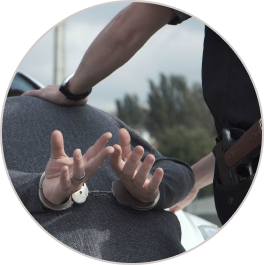Being subject to a restraining order can significantly impact a person’s life, particularly when it comes to their family. Someone with a restraining order against them may be unable to see their children and be barred from going to certain places. Violating a restraining order carries harsh penalties, such as jail time and hefty fines.
If someone has filed for a restraining order against you, contact the Law Offices of Jonathan F. Marshall right away. Our lawyers have decades of legal experience representing clients inside and outside the courtroom. Our team consists of former prosecutors and public defenders who worked throughout New Jersey, which means we are deeply familiar with state law and local courts. We can explain the New Jersey restraining order laws to you, prepare you for your final restraining order hearing, and work to have a restraining order modified or removed.
Let us protect your rights and your freedoms during this challenging time. Contact our office today for a free, confidential consultation with a Union County, NJ, restraining order violation lawyer.
What Are the New Jersey Restraining Order Laws?
A restraining order is a legal order barring an individual from engaging in certain activities or being near certain people or locations. Restraining orders are civil orders, which means simply being subject to a restraining order will not land you in jail. However, purposely violating a restraining order is a crime under NJ Rev. Stat. 2C:29-9 that is punishable by jail time. Because restraining orders are civil orders, a person seeking to file for a restraining order must do so in court.
The Prevention of Domestic Violence Act of 1991 outlines the laws regarding restraining orders in domestic violence cases. Generally, to obtain a restraining order as part of a domestic violence complaint, the person must be a victim of domestic violence as defined by New Jersey law, which means the perpetrator of the alleged abuse is a spouse, former spouse, co-parent, or partner. However, New Jersey law allows a victim of sexual assault to obtain a restraining order against their alleged attacker even if the victim is not in a relationship with the attacker.
Provisions in a restraining order may include the following:
- Ordering the defendant to stay away from the plaintiff or leave their home
- Barring the defendant from places the plaintiff frequently visits, such as school or work
- Blocking the defendant from contacting the plaintiff through a third party
- Prohibiting ownership or possession of firearms or weapons
- Modifying child custody arrangements
What Are the Types of Restraining Orders in New Jersey?
Generally, there are two types of restraining orders: temporary restraining orders (TROs) and final restraining orders (FRO).
According to the New Jersey Courts, a temporary restraining order is typically in place until a court hearing can be scheduled, where the judge will hear from both parties. A party must go to the courthouse to obtain a TRO, where a hearing officer or judge will listen to the case and decide whether to issue the restraining order. The party against whom the TRO is being filed does not need to be present.
If the court issues the TRO, the court will send a copy to the police to give to the defendant. Another hearing will be scheduled within 10 days, where both parties will be present. The judge will either rescind the order or issue a final restraining order. An FRO will be in effect permanently.
Restraining orders also may differ according to the reason behind the order. Those who have suffered abuse from a spouse, dating partner, family members, or their child’s other parent can file for a domestic violence restraining order. If someone is sexually assaulted by someone they know but are not in a relationship with, the victim may file for a sexual assault restraining order. A sexual assault restraining order prevents the alleged perpetrator from contacting the victim.
What Are Grounds for a Temporary Restraining Order in Union County, NJ?
According to New Jersey’s laws on filing domestic violence complaints, judges may grant a temporary restraining order when necessary to protect the health, life, or well-being of the person who applied for the order. The judge can decide based on the sworn testimony of the victim or another party who represents the applicant if the applicant cannot appear.
The perpetrator of the alleged abuse does not have to appear in court for a judge to issue a temporary restraining order. A victim of domestic violence does not have to have physical evidence to file for a temporary restraining order, though physical evidence may help their case.
What’s the Difference Between a Temporary Restraining Order and a Final Restraining Order?
The critical difference between temporary and final restraining orders is the duration. A temporary restraining order typically lasts for 10 days, at which point a judge will hold a hearing to decide whether to make the order permanent. A final restraining order lasts indefinitely unless the person who filed for the order or the person subject to it petitions to have it vacated. Convincing the court to modify or rescind a final restraining order usually requires help from an experienced Union County restraining order violation attorney.
Where Are Restraining Order Cases Heard in Union County, NJ?
In Union County, restraining order cases are heard at the Family Division of the Union County Superior Court in Elizabeth, New Jersey. The Superior Court building is also where domestic violence victims may file for a temporary restraining order.
If the courts are closed, victims of domestic violence or sexual assault can file for a temporary restraining order at a police station or fire station. Most jurisdictions in New Jersey have an on-call judge who can issue a restraining order in an emergency, and the police or fire department will likely know how to reach the judge.
What Are the Penalties for a Restraining Order Violation?
Violating any New Jersey court order, including a restraining order, can lead to a contempt of court charge. According to New Jersey law, violating a court order is either a disorderly persons offense, which is New Jersey’s term for a misdemeanor; or a fourth-degree crime, equivalent to a felony, depending on the facts of the case. Penalties for a disorderly persons offense include up to six months in jail and a $1,000 fine, while the penalties for a fourth-degree crime include up to 18 months in prison and a $10,000 fine.
Can You Lift or Revoke a Restraining Order in Union County, NJ?
A temporary restraining order in New Jersey lasts for about 10 days, at which point the courts must convene a hearing. Depending on the available evidence, the judge may let the order expire at the hearing or make it permanent. If the judge makes the order permanent, it is called a final restraining order.
It is possible to modify or revoke a final restraining order, though doing so usually requires help from an experienced attorney. To change an existing restraining order, the defendant or plaintiff must file a petition with the court that issued the final order. The party who filed the petition must also provide evidence showing that the restraining order is no longer necessary.
What Can a Union County Restraining Order Defense Lawyer Do for My Case?
Some of the ways a restraining order defense attorney can help with your case include the following:
- Explaining the Relevant Laws – The laws governing restraining orders in New Jersey can be complex, but understanding them is crucial if someone has accused you of domestic violence or filed a restraining order against you. A Union County restraining order defense attorney can review the relevant statutes with you and explain how they apply to your case.
- Reviewing the Terms of a Temporary Restraining Order – If someone obtains a temporary restraining order against you, there is not much you can do until the courts convene a hearing to decide on a final restraining order. In the meantime, you must understand and follow the terms of a temporary restraining order. Violating the order could lead to criminal penalties and loss of the ability to block a final restraining order. A Union County restraining order defense lawyer can explain the provisions of a temporary restraining order and advise you on what to do next.
- Modifying a Final Restraining Order – It is possible to alter a final restraining order in New Jersey, but you will likely need evidence that you have reasonable cause to modify or dissolve the order. A Union County restraining order defense attorney can help you prepare a petition to change the order and assist you with making your case before a judge.
Contact a Union County, NJ, Restraining Order Lawyer Today
Being subject to a restraining order could have significant consequences on your life, including being forced to leave your home, prohibited from seeing your children, or barred from exercising your rights. The Union County restraining order lawyers with the Law Offices of Jonathan F. Marshall know how complex these cases can be and can vigorously protect your interests.
Our office is conveniently located near the Union County Superior Court in Elizabeth, New Jersey, and we can meet with you wherever is best for you. Contact us today to get started with a free consultation.













